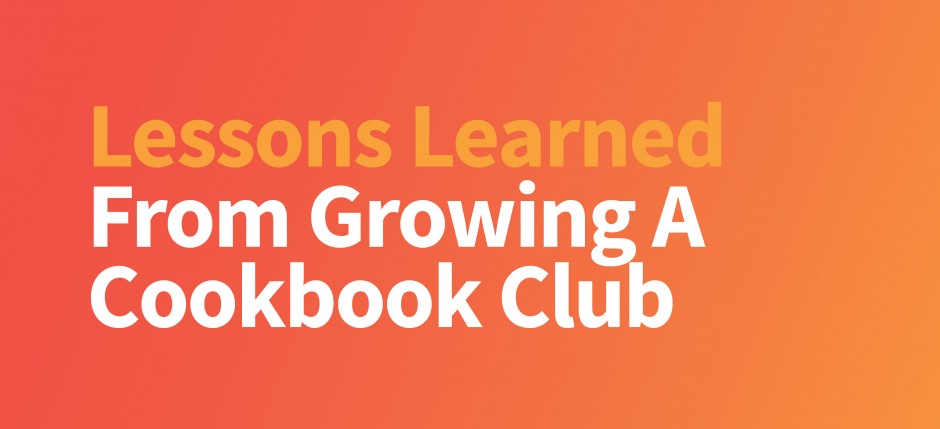Lessons Learned From Growing A Cookbook Club
by Haley Cahill-Teubert
I dreamed of living in a large city as long as I can remember. From birth to 21, I lived in small towns and I fantasized about something bigger. So when I graduated college, I packed my boxes, loaded up my 2003 Honda and drove until I reached my destination: Nashville, Tennessee.
After living there an entire five seconds, I told myself I’d never live in a small town again. As it turns out, life had a bit of a different plan for me. Just short of three years in Music City, I moved back to my hometown in West Virginia so my husband and I could be close to family.
I can’t speak for everyone who moves back to their hometown, but I’ll tell you it’s been a rough transition for several reasons, but a large one revolves around friends, or lack thereof.
Sure, my family is here, but can we all appreciate that’s different? And the people I knew in high school are either in other parts of the country now or still here, but just… different people. We’ve changed. So even though I moved back home, in many ways it felt like a brand new place where I don’t know a soul. And let me be clear: That sucked. That was not a good feeling.
So one day, I was watching this cooking show and there was mention of a cookbook club. Have you ever heard of a cookbook club?
I hadn’t. It’s essentially a glorified potluck, where everyone picks a recipe from a specified book, prepares said recipe, and brings it to the event to enjoy with friends.
I was totally into that 1) because I love to eat, and 2) because I was gifted a ton of cool cookbooks as wedding gifts, so this would be a fun way to put them to work.
I call my sister and she’s on board. So, we invited the few people we did know and asked them to do the same. We set a date and a time and I was super pumped. Ahead of the cookbook club gathering, I scrubbed my house top to bottom. Lit every candle I could find and dug out the good plates. If all else failed, at least the house was clean.
People began showing up. Some I knew, most I didn’t. But it took seriously no time for it to turn into a party. It was going better than I imagined.
I sat at a table with some women I wanted to know better. One of the women turned to me and said: “This is just great. I love it. Where’d you get the idea?”
I shared with her the bit from the TV show… I told her I had a bunch of cookbooks… And then I paused for just a moment, trying to decide just how honest to be with this new friend of mine, and I said: “Well, also because I’m new to the area and I just don’t really have any friends. It’s been hard to meet people and I was hopeful this would be a good way to do that.”
There was this simultaneous audible agreement by everyone at the table… “Yes, it is hard to meet people.” I wasn’t alone and we all connected over that. The conversation that flowed after that was so, so good. We talked about vacations, significant others, jobs, cooking fiascos–anything and everything under the sun.
That first cookbook club gathering was in October of 2018, and we’ve been meeting once a month since then, with new faces joining us each time.
This is a story about me seeking human connection–about friendships. I wanted a place of belonging. I wanted purpose. Isn’t that what we seek in sorority? Friendships? A place of belonging? Purpose? So that’s what I created with this cookbook club, and there are some specific components that made cookbook club so successful that go hand in hand with how you prepare and execute recruitment.
First things, first. I scrubbed my house from top to bottom and dug out the good dinnerware. I wanted to be a good host. I wanted people to feel welcome there… so welcome that they wanted to keep coming back. Cleaning the house is a good way to do that, but an even better way I did that was by opening my house to total strangers, engaging with every person who walked in the door, introducing them to others, being kind and warm. This is generosity.
Most of the time, we associate generosity with money or gifts, but that’s not always what’s meant. We show generosity in the ways we treat people, the ways we engage with them, the ways we make them feel.
What are five ways you can be generous to PNMs during recruitment that don’t involve money or gifts?
The conversations at cookbook club were so much deeper than I thought they’d be. I expected to swap recipes, but we talked about relationships, cooking dilemmas, worst first dates, in-laws, jobs, vacations, hobbies…. None of those fun conversations would have happened without curiosity. The conversation may have started with: How did you and your husband meet? And then went to places like: And that’s when you decided to start a jewelry business? And then to: Wait a minute, you did what in Mexico?! The conversations were so soul-filling. The conversations were full of moments of: “Oh my gosh I can’t imagine going through that” and moments of loud, hysterical, deep belly laughs. None of these moments, these jokes, these stories would have happened without each of us being curious about the others.
Those are the kind of conversations and connections we crave, but we rarely get those in a recruitment. And it’s because we have a culture of conditioned curiosity. We only ask about the things we need to know about a potential new member like academic achievement and campus involvement. And after we ask, we’re ready to be bumped. Does that sound familiar?
I give you permission to be curious. But here’s a tip. Don’t scare PNMs with your curiosity. Asking them “what aisle in the grocery store they’d shop in for the rest of their lives” or “if they could be any flavor of ice cream what would it be” are not normal things to be curious about. Be normal.
What are five questions you wish you had been asked during recruitment that would have let your true self shine?
Right before the conversations really picked up, something important happened. Someone was curious and asked me why I started the club. I gave a super polite answer… I like to cook and I have cookbooks. But then I took a chance and told them I didn’t have many friends in the area. I was having difficulty meeting new friends and hoping this would be a good opportunity to find some. That was a vulnerable moment for me. No one wants to say out loud: I don’t have any friends.
But I said it. And it made all the difference because we connected over that. Had I not said that, I never would have known they felt the same way too. I never would have felt safe enough to share silly stories or exchange phone numbers at the end of the night. Taking advantage of the opportunity to be vulnerable and share what was really on my heart was a pivotal moment. Sometimes we think of vulnerability as being weak or crying, but I think vulnerability is simply feeling safe enough to let someone into your heart without fear of the outcome.
Now realistically, vulnerability takes time. Some people open right up, but others need to know you for a long time before they feel comfortable doing that. Vulnerability can move your conversations and relationships in really remarkable directions, but we need to appreciate everyone will approach that at a different time. To create an environment where that can happen though, I’d call back to the things I said about being generous and curious.
A fourth way we can create environments that allow relationships to develop and bloom is simply by being ourselves.
When I hosted that first cookbook club, I did things like make sure my house was spotless, create a cool playlist, and wear an outfit that made me happy and comfortable because I felt like that’s how I needed to put my best foot forward. But listen: I live in a 1,200 square foot townhouse. I made my home look nice, but I didn’t present it as something it wasn’t. I dug out my good dinnerware, yes, but I didn’t go out and buy new china I knew I couldn’t afford. And I didn’t tell stories to impress these people–I told stories that were true. I was myself. I was presenting the best version of myself, but I was myself. And to my knowledge, no one has been disappointed about that!
We’ve got to be ourselves in recruitment. We can’t sell our chapters as something we’re not. We can’t tell PNMs we value academics if we have the lowest GPA on campus. We can’t talk about how amazing it is to live in the chapter house if no one actually wants to live there. We can’t spend an entire day of work week talking about spray tans, eyelash extensions and appropriate nail colors if our vision of “best self” isn’t shared by everyone else in the chapter. We’ve got to be honest. We’ve got to be authentic.
If I can meet friends, develop connections, and grow a dang cookbook club in my teeny tiny town by being generous, curious, vulnerable and authentic with the people who attend, you absolutely can create connections during recruitment and grow your organization in the same way.

